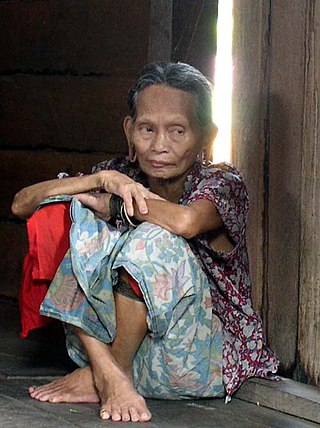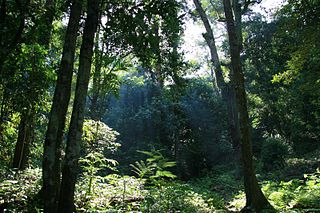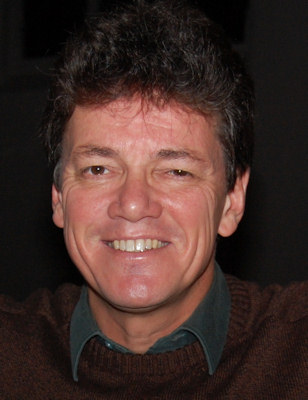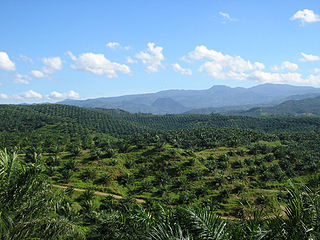
Borneo is the third-largest island in the world, with an area of 748,168 km2 (288,869 sq mi). Situated at the geographic centre of Maritime Southeast Asia, it is one of the Greater Sunda Islands, located north of Java, west of Sulawesi, and east of Sumatra.

The Dayak or Dyak or Dayuh are one of the native groups of Borneo. It is a loose term for over 200 riverine and hill-dwelling ethnic groups, located principally in the central and southern interior of Borneo, each with its own dialect, customs, laws, territory, and culture, although common distinguishing traits are readily identifiable. The Dayak were animist in belief; however, since the 19th century there has been mass conversion to Christianity as well as Islam due to the spreading of Abrahamic religions.

The Indonesia–Malaysia confrontation or Borneo confrontation was an armed conflict from 1963 to 1966 that stemmed from Indonesia's opposition to the creation of the state of Malaysia from the Federation of Malaya. After Indonesian president Sukarno was deposed in 1966, the dispute ended peacefully.

South Kalimantan is a province of Indonesia. It is the smallest province in Kalimantan, the Indonesian territory of the island of Borneo. The provincial capital was Banjarmasin until 15 February 2022 when it was legally moved to Banjarbaru. The population of South Kalimantan was recorded at just over 3.625 million people at the 2010 Census, and at 4.07 million at the 2020 Census. The official estimate as at mid 2023 was 4,221,929. One of the five Indonesian provinces in Kalimantan, it is bordered by the Makassar Strait in the east, Central Kalimantan in the west and north, the Java Sea in the south, and East Kalimantan in the northeast. The province also includes the island of Pulau Laut, located off the eastern coast of Kalimantan, as well as other smaller offshore islands. The province is divided into 11 regencies and 2 cities. South Kalimantan is the traditional homeland of the Banjar people, although some parts of East Kalimantan and Central Kalimantan are also included in this criterion. Nevertheless, South Kalimantan, especially the former capital city Banjarmasin has always been the cultural capital of Banjarese culture. Many Banjarese have migrated to other parts of Indonesia, as well as neighbouring countries such as Singapore and Malaysia. In addition, other ethnic groups also inhabit the province, such as several groups of the Dayaks, who mostly live in the interior part of the province, as well as the Javanese, who mostly migrated from Java due to the Transmigration program which dated from the Dutch colonial era. It is one of the provinces in Indonesia that has a larger population than Mongolia.

Kaharingan is an indigenous monotheistic folk religion of the Dayak people such as Katingan, Lawangan, Ma'anyan, Ngaju, Ot Danum people native to the Central Kalimantan and South Kalimantan region in Indonesia.
Sinar Mas is one of the largest conglomerates in Indonesia. It was formed in 1938. It has numerous subsidiaries including Asia Pulp & Paper and palm oil producer PT SMART. The company also acquired Berau Coal Energy from Asia Resource Minerals PLC, a major mining group founded by Nathaniel Rothschild, in a takeover initiated by Fuganto Widjaja.

The Penan are a nomadic indigenous people living in Sarawak and Brunei, although there is only one small community in Brunei; among those in Brunei half have been converted to Islam, even if only superficially. Penan are one of the last such peoples remaining as hunters and gatherers. The Penan are noted for their practice of 'molong' which means never taking more than necessary. Most Penan were nomadic hunter-gatherers until the post-World War II missionaries settled many of the Penan, mainly in the Ulu-Baram district but also in the Limbang district. They eat plants, which are also used as medicines, and animals and use the hides, skin, fur, and other parts for clothing and shelter.

Bruno Manser was a Swiss environmentalist and human rights activist. From 1984 to 1990, he stayed with the Penan tribe in Malaysia, organising Indigenous rainforest blockades in Sarawak against timber companies. After he emerged from the forests in 1990, he engaged in public activism for rainforest preservation and the human rights of indigenous peoples, especially the Penan, which brought him into conflict with the Malaysian government. He also founded the Swiss non-governmental organization (NGO) Bruno Manser Fonds in 1991. Manser disappeared during his last journey to Sarawak in May 2000 and is presumed dead.

Mount Palung National Park lies on the island of Borneo, in the Indonesian province of West Kalimantan, north of Ketapang and east of Sukadana.

Asia Pulp & Paper (APP) is an Indonesian pulp and paper company based in Jakarta, Indonesia. One of the largest pulp and paper companies in the world, it was founded as Tjiwi Kimia by Eka Tjipta Widjaja in 1972. Asia Pulp & Paper is a subsidiary of Sinar Mas Group and was officially formed in 1994 when Sinar combined its paper and pulp operations from Tjiwi Kimia and PT Inda Kiat Pulp & Paper.

The Kahayan River, or Great Dayak River, is the second largest river after the Barito River in Central Kalimantan, a province of Indonesia in Kalimantan – the Indonesian part of the island of Borneo. With a total length of 658 km (409 mi) and with a drainage basin of 15,500 km2 (6,000 sq mi) in South Kalimantan, Indonesia. Mean annual discharge 1,178 m3/s (41,600 cu ft/s). The provincial capital Palangkaraya lies on the river. The main inhabitants are Dayaks, who practice slash-and-burn rice cultivation and pan for gold on the upper reaches. The lower Kayahan flows through a rich and unusual environment of peat swamp forests, which has been severely degraded by an unsuccessful program to convert a large part of the area into rice paddies, compounded by legal and illegal forestry.

The Borneo Orangutan Survival (BOS) Foundation is an Indonesian non-profit non-governmental organization founded by Dr. Willie Smits in 1991 and dedicated to the conservation of the endangered Bornean orangutan and its habitat through the involvement of local people. It is audited by an external auditor company and operates under the formal agreement with the Indonesian Ministry of Forestry to conserve and rehabilitate orangutans. The BOS Foundation manages orangutan rescue, rehabilitation and re-introduction programmes in East and Central Kalimantan. With more than 400 orangutans in its care and employing more than 440 people at a 10 sites BOS Foundation is the biggest non-human primate conservation non-governmental organization worldwide. Nyaru Menteng and Samboja Lestari are the BOS Foundation sites that have received most extensive media coverage. Nyaru Menteng, founded by Lone Drøscher Nielsen, has been the subject of a number of TV series, including Orangutan Diary, Orangutan Island and the series Orangutan Jungle School, airing since 2018.
Lone Drøscher Nielsen is a Danish wildlife conservationist who established the Nyaru Menteng Orangutan Reintroduction Project in Kalimantan, Borneo, Indonesia in 1998.

Deforestation in Indonesia involves the long-term loss of forests and foliage across much of the country; it has had massive environmental and social impacts. Indonesia is home to some of the most biologically diverse forests in the world and ranks third in number of species behind Brazil and the Democratic Republic of Congo.

Willie Smits is a trained forester, a microbiologist, conservationist, animal welfare activist, wilderness engineer and social entrepreneur. He has lived in Indonesia since 1985 and is an Indonesian citizen. He is married to Adrienne C. Watson since March 2016.

Deforestation in Borneo has taken place on an industrial scale since the 1960s. Borneo, the third largest island in the world, divided between Indonesia, Malaysia and Brunei, was once covered by dense tropical and subtropical rainforests.

Samboja Lestari is a Bornean orangutan rescue and rehabilitation centre, tropical rainforest restoration project, sun bear sanctuary, and eco-lodge located in the district of Samboja in Kutai Kartanegara Regency, East Kalimantan, Indonesia, owned and operated by the Borneo Orangutan Survival (BOS) Foundation. According to its founder, Willie Smits, Samboja Lestari uses the principles of People, Planet, Profit, attempting to provide incomes for local people using conservation. It is located about 38 kilometres from Balikpapan.
Lamandau River is a river of Kalimantan, southern-central Borneo, Indonesia. Downstream after passing the village of Nanga Bulik it becomes the Kotawaringin River.

Palm oil production is important to the economy of Indonesia as the country is the world's biggest producer and consumer of the commodity, providing about half of the world's supply. In 2016, Indonesia produced over 34.6 million metric tons of palm oil, and exported 25.1 million metric tons of it. Oil palm plantations stretch across at least 12 million hectares. There are several different types of plantations, including small, privately owned plantations, and larger, state-owned plantations. There are a variety of health, environmental, and societal impacts that result from the production of palm oil in Indonesia. A recent publication by the NGO Rainforest Action Network (RAN) indicates that the use of palm oil by some of the biggest chocolate and snacks' producers is increasing this problem.

There are three species of orangutan. The Bornean orangutan, the most common, can be found in Kalimantan, Indonesia and Sarawak and Sabah in Malaysia. The Sumatran orangutan and the Tapanuli orangutan are both only found in Sumatra, Indonesia. The conservation status of all three of these species is critically endangered, according to the International Union for Conservation of Nature (IUCN) Red List.